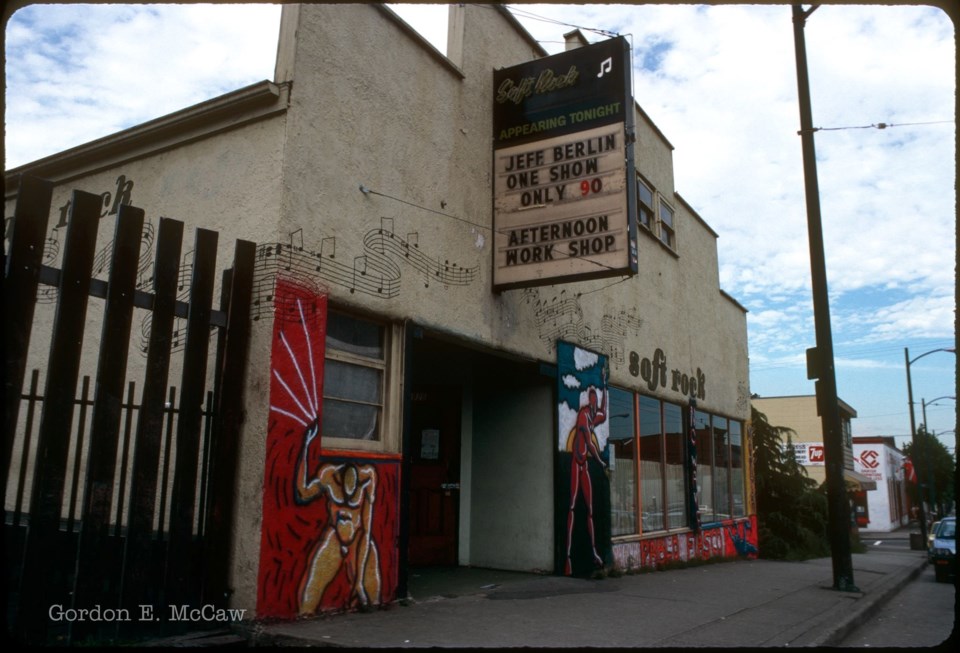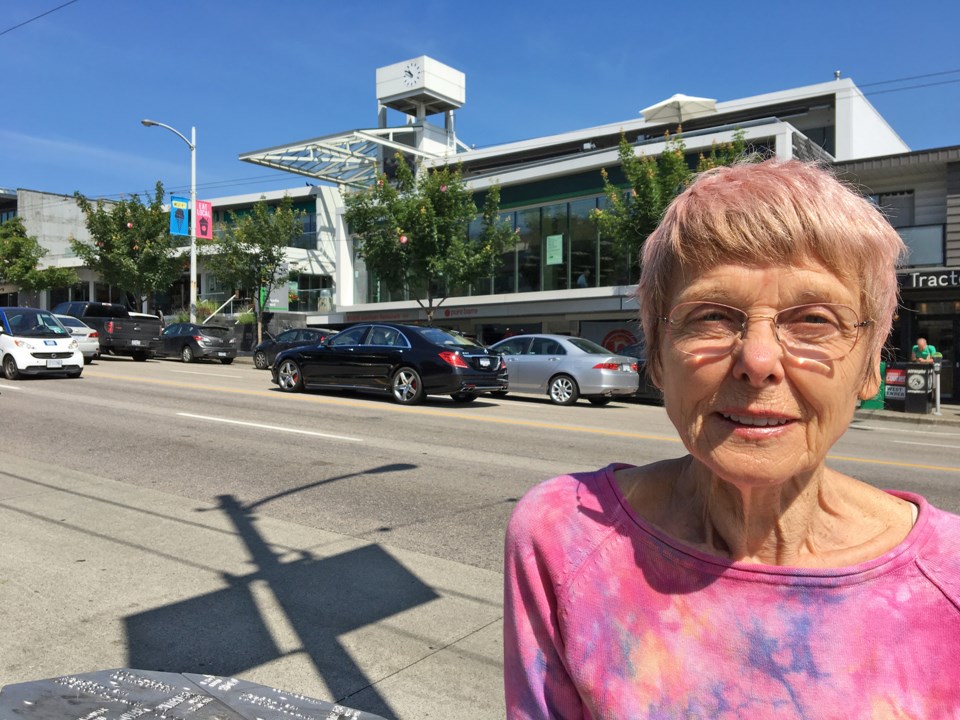“The Soft Rock was an international living room. Everyone was welcome.”
That’s how Patti Fiedler summed up her café to a reporter from the Ubyssey in 1978, when her famous coffee house venue in the heart of Kitsilano was temporarily closed due to a noise infraction.
Fiedler opened the Soft Rock Café on the corner of 4th and Cypress in 1976. She owned and operated it until 1983. It’s one of those venues – like the Town Pump, the Cave, or the Railway – that a generation of Vancouverites revere, but about which details are often foggy.
Luckily, at a spry 81 years young with pink hair, Fiedler remembers it all.
Now an internationally recognized tapestry artist (who for years has gone by Sola Fiedler, or just Sola, instead of Patti), Fiedler was born in England in 1936. She moved to Canada when she was 23, arriving in Toronto with six dollars in her pocket.
She soon found work at one of the dozens of basement coffee houses in bohemian Yorkville during the birth of the folk scene. After a week of working in the packed café, she decided to open her own.
In 1962, the Mousehole – a 55-seat basement coffee house right on Yorkville Avenue, where everything was happening – was born.
“The Mousehole immediately made money,” says Fiedler. “Young kids like Neil Young, Joni Mitchell and Gordon Lightfoot would play acoustically in the corner and we’d pass the hat.”
After about a year, the musicians wanted a bigger place to play, so Fiedler and her husband Bernie opened a new basement club called the Riverboat. It became the centre of the Canadian music universe.
“I would get in my car and drive to New York or Chicago and go into their basement clubs,” remembers Fiedler. “In Chicago, I’d find blues musicians like a young Buddy Guy or Albert Collins and bring them up for a week. And they’d never left Chicago! They were terrified of the border!
“In New York I found people like Kris Kristofferson and James Taylor and brought them up to play.”
All things must pass and, by the beginning of the 1970s, after an attempted robbery left Fiedler beaten, she and her daughter took off for a new life in Japan.
The plane stopped over in Vancouver. Fiedler and her daughter got off to look around. They never got back on.
“Vancouver was just so beautiful,” she recalls. Fiedler subsequently attended art school and opened a very successful gallery in Deep Cove.
Then, one fateful day in the mid-1970s, years after the area’s famed flower power had wilted, she found herself in the heart of Kitsilano.
“What I’d give for a cappuccino right now,” she exclaimed, looking up and down 4th Avenue. Locals directed her to Commercial Drive and it was a light bulb moment.
“Kits was dead in the mid-’70s,” says Fiedler. Besides Quintessence Records, which was a block down, later becoming Zulu Records, Fiedler remembers “mostly boarded up storefronts and hardly any restaurants. All the hippies were gone. Even the employees of CFUN Radio would come and go through the back door so no one would see them either.”

Directly across the street from CFUN, at 1921 West 4th Ave., sat an old, wood-framed western false-front building that used to be a mattress factory and showroom, with huge floor-to-ceiling front windows. Fiedler thought it could work.
A seven-year lease was arranged and six months were spent renovating the 5,000-square-foot space into what would become the Soft Rock Café, a spin on the original Hard Rock Café from her native London.
“We were an all-ages coffee house music venue. There was no alcohol. Imagine that today?”
According to the Ubyssey, the Soft Rock served “six coffees, nine teas and cakes, breads, date squares and bagels.” Fiedler did most of the baking as well as the band bookings.
“We started with locals like Jim Byrnes, Powder Blues and DOA, and branched out into international artists like Ravi Shankar, Dexter Gordon and Dan Hill.”
The Soft Rock was an immediate hit. Opening night was in May 1976.
“Our capacity was 100 people and 600 showed up. Local musicians appeared out of the woodwork. We had an amazing night.
“I purposefully made these big large wooden booths that could hold 10 people, so everyone could talk and play games. Soon we were booking 25 acts a month. And we didn’t even have bouncers! If things got too wild with crowd-surfing or whatnot, I’d roll up a newspaper, wade into the dance floor and swat them.”
By 1983, Fiedler had the itch to become an artist. She sold the Soft Rock and changed her name. Even though the capacity had expanded to 500, the café barely lasted another year before it closed for good.
“It turned out that, for a while anyway, the Soft Rock Café was exactly what Vancouver needed at that time,” Fiedler says. “Lots of people made it their second home. ... There’s never really been anything like it since.”
These days, 1921 West 4th is a shiny new complex with a bank, a UPS outlet and a yoga studio. And all things must pass.



